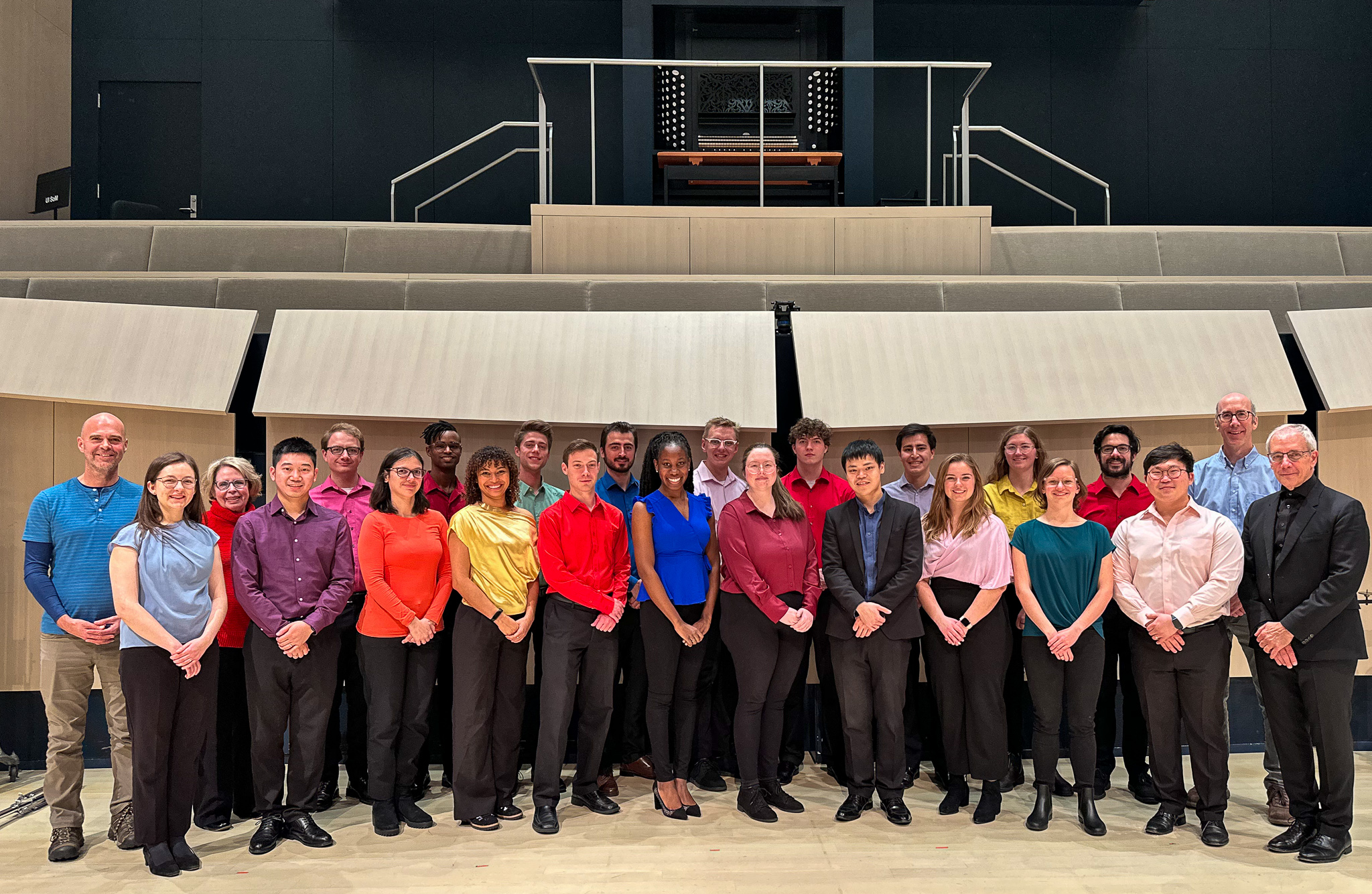CNM Ensemble Concert II
Sunday, December 4, 2022 at 7:30p in the Concert Hall
with guest composer James Ogburn
Program
In Between (2022) |
Eric NATHAN(b. 1983) |
Grand Rounds (2018) |
Shulamit RAN(b. 1949) |
| Tâmila Freitas de Souza, flute Lisa Ryoo, oboe Sayyod Mirzomurodov, clarinets Eugene Ryoo, saxophones Kristen Ronning, horn McKenna Blenk and Gabe Albertus, percussion Pam Weest-Carrasco, harp Craig Jordan, piano Junhong Zhou, violin I Michael Klyce, violin II (Nathan) ShengHo Wang, violin II (Ran) Fatima Gassama, viola Hanna Rumora, violoncello David Gompper, conductor |
intermission
Ambidexterity (2016), for cello duet |
James OGBURN(b. 1974) |
| Hanna Rumora & Josh DeVries, violoncelli |
Ambas (2022), for large ensemble - world premiere |
Sam YOUNG(b. 1975) |
| Tâmila Freitas de Souza, flute Lisa Ryoo, oboe Sayyod Mirzomurodov, clarinet/bass clarinet Carlos Manuel Lopez Soria, bassoon Kristen Ronning, horn Anna Kelly, trumpet Ethan Sherer, trombone McKenna Blenk and Peter Grubisich, percussion Junhong Zhou, violin I Ramel Price, violin II Fatima Gassama, viola Hanna Rumora, violoncello Natalia Terra, double bass David Gompper, conductor |
Program Notes
| In between (2022) for ensemble was born out of the unique collaborative and explorative workshop experience afforded by composing for the Grossman Ensemble at the University of Chicago Center for Contemporary Composition. The players invent rustling, feathery sounds, the conductor “paints” gesturally through the ensemble in a music filled with chorale-like singing, meditative stillness and intricately vibrant musical textures woven through it all. The emotional inspiration for the work came from my standing in a forest near my house this fall on a late afternoon. As I stood there amidst the trees – these magisterial, quiet, monumental, and seemingly wise beings – I felt their imposing yet comforting presence, and listened to all the motion and movement that seemed to inhabit the “quiet” that surrounded me. It reminded me of a visit I made to my friend’s property in Vermont a few years prior, on an invitation to come and “meet” the trees that are so dear to him. He told me how at his age he now speaks with them and hoped they might speak to me. This has all been a starting point that unlocked my imagination in surprising ways, creating within and between spaces of stillness and activity and listening and singing. In Between for ensemble was commissioned by the Chicago Center for Contemporary Composition for the Grossman Ensemble, and is dedicated to the Grossman Ensemble, conductor Timothy Weiss, and director and founder Augusta Read Thomas, with admiration and gratitude. |
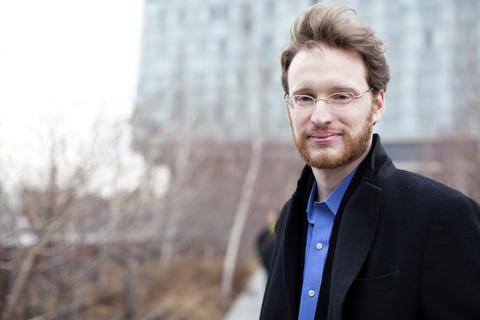
Recent projects include three commissions from the Boston Symphony Orchestra. Opening (2021), co-commissioned by the Milwaukee Symphony Orchestra and Serge Koussevitzky Music Foundation at the Library of Congress, was premiered by the MSO and broadcast nationally on PBS. He has received commissions from the New York Philharmonic, Chamber Music Society of Lincoln Center, Barlow Endowment, Fromm Music Foundation, Tanglewood Music Center, and Aspen Music Festival, and has been honored with a Goddard Lieberson Fellowship and Charles Ives Scholarship from the American Academy of Arts and Letters. Nathan has completed residencies at Yellow Barn, Copland House, and American Academy in Rome, and is a 2022 Civitella Ranieri Foundation fellow. Nathan’s most recent album, Missing Words, was released in 2022 on New Focus Records. He serves as Associate Professor of Music at Brown University and is currently the New England Philharmonic’s Composer-in-Residence. He received his doctorate from Cornell. |
| Grand Rounds - At the beginning there is the blank page, the start of a compositional journey into the unknown. My first step as composer is to ask myself what are some of the “givens” to be confronted, usually pre-determined by the artist or group for whom the work is intended, and what are some parameters - you can call them “limits”, or “rules of the game” - I will be setting for myself as the work’s governing principles. In the case of Grand Rounds the “givens’ were, first and most significantly, a fixed sized mini-orchestra of 14 instrumentalists, as well as an approximate length of some 15 minutes (I think of it as the size of canvas I am to use). Next, as I began composing, what gradually evolved (my “rules of the fame”) was an idea of a series of recurring musical organisms of diverse character and function that would be subjected to continuing variation as they appear at various junctures of the piece, gradually building into an organic whole. Most prominent among these are: the opening - a simple, two-note motif that gently bounces between the piano and vibraphone as it expands gradually - this idea returns in a modified form to round off the work’s loosely structured arch-form; a lyrical solo oboe line that reappears, modified, at several points of demarcation of the piece; and finally a colorful, extravagantly shaped 7-note descending figure that loops upon itself as it climbs back up, played by the piano in a series of flamboyant flourishes and surrounded by a battery of percussion instruments, with mallet instruments (such as vibraphone, xylophone, and crotales) dominant. This idea, permeating a significant portion of the work’s important center section, repeats in a variety of forms numerous times at the most local level, returning in larger blocks as well. Moreover, it is this idea that creates further “orbits” that form their own “rounds” that peak independently, yet eventually cohere into a totality before bringing the work full circle and trailing off into the distance. |
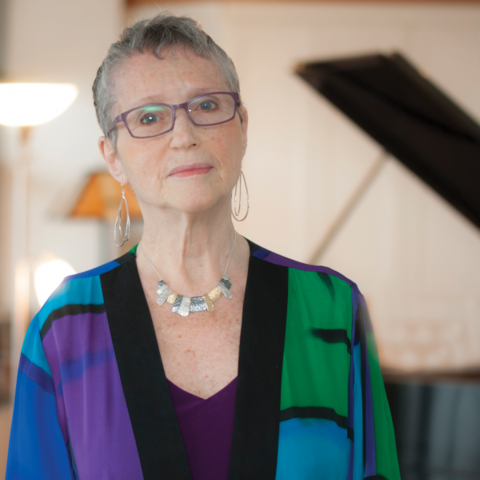
In addition to receiving the Pulitzer Prize in 1991, Ran has been awarded most major honors given to composers in the U.S., including two fellowships from the Guggenheim Foundation, grants and commissions from the Koussevitzky Foundation at the Library of Congress, the National Endowment for the Arts, the Fromm Music Foundation, Chamber Music America, the American Academy and Institute for Arts and Letters, first prize in the Kennedy Center-Friedheim Awards competition for orchestral music, and many more. Her music has been played by leading performing organizations including the Chicago Symphony under both Daniel Barenboim and Pierre Boulez, the Cleveland Orchestra under Christoph Von Dohnanyi in two U.S. tours, the Philadelphia Orchestra under Gary Bertini, the Israel Philharmonic under Zubin Mehta and Gustavo Dudamel, the New York Philharmonic, the American Composers Orchestra, The Orchestra of St. Luke’s under Yehudi Menuhin, the Baltimore Symphony, the National Symphony (in Washington D.C.), Contempo (the Contemporary Chamber Players) at the University of Chicago under both Ralph Shapey and Cliff Colnot, the Orchestre de la Suisse Romande, the Jerusalem Orchestra, the vocal ensemble Chanticleer, and various others. Chamber and solo works are regularly performed by leading ensembles in the U.S. and elsewhere, and recent vocal and choral ensemble works have been receiving performances internationally. Between 1990 and 1997 she was Composer-in-Residence with the Chicago Symphony Orchestra, having been appointed for that position by Maestro Daniel Barenboim as part of the Meet-The-Composer Orchestra Residencies Program. Between 1994 and 1997 she was also the fifth Brena and Lee Freeman Sr. Composer-in-Residence with the Lyric Opera of Chicago, where her residency culminated in the performance of her first opera, “Between Two Worlds (The Dybbuk)." She was the Paul Fromm Composer in Residence at the American Academy in Rome, September-December 2011. Ran served as Music Director of “Tempus Fugit," the International Biennial for Contemporary Music in Israel in 1996, 1998 and 2000. Since 2002 she is Artistic Director of Contempo (Contemporary Chamber Players of the University of Chicago). In 2010 she was the Howard Hanson Visiting Professor of Composition at Eastman School of Music. Shulamit Ran is an elected member of the American Academy of Arts and Letters, where she was Vice President for Music for a 3-year term, and of the American Academy of Arts and Science. The recipient of five honorary doctorates, her works are published by Theodore Presser Company and by the Israeli Music Institute and recorded on more than a dozen different labels. The recently completed Glitter, Doom, Shards, Memory, String Quartet No. 3, was commissioned by Music Accord, a consortium of concert presenters in the U.S. and abroad, for Pacifica Quartet, and will receive its first performance in June 2014 in Tokyo. |
| Ambidexterity (2016) – I believe the most difficult thing to write is a solo piece. More difficult than this most difficult thing – a duo for two like instruments. Few have succeeded (I’m thinking of Ravel’s sonata for violin and cello, as well as Kodaly’s duo for the same instruments) but I love a challenge. Written for Wendy Warner and Dave Eggar, this work is meant to challenge and reward them but, also, to stay with them through an enjoyable musical experience. The piece is really about their mismatch as virtuoso players who conjure two very different sounds. I toyed with the notion of contrasting colors by controlling successive intervals slightly differently, when each player takes the melody. The result is distinct affects, akin to “modality,” between the parts. Although the piece follows a clear, conversational trajectory, it is not meant to be one of conflict. In the end, one voice does not dominate. Rather, they coexist like two hands on an ambidextrous child. –JJO, January 2017 |
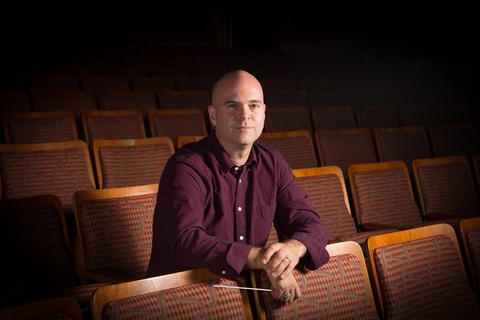
|
| Ambas (2022) for chamber ensemble, was written as an exploration of the frenetic energy of the flora, fauna, and climate here in Iowa. Having lived most of my life in the western U.S., I am often struck by the vibrance and relentless energy of the natural environment of the Midwest—the raucous drone of cicadas and crickets on summer evenings, the bursts of color and rustling leaves in the fall, the flocks of migrating birds and the austere, serene landscape in the winter. Ambas is comprised of three scenes, each inspired by the sights and sounds of Iowa: a restless and energetic opening that depicts wildlife—birds and insects, rabbits and foxes—rushing about their daily errands; an introspective interior middle section set in the stillness of winter; a closing paean to evenings on the porch, taking in the warmth, beauty, and mystery of summer nights. |
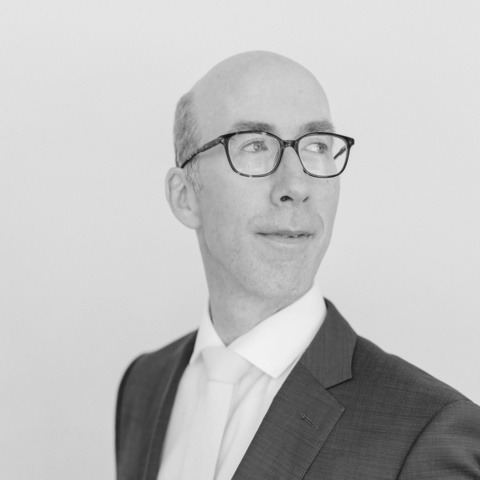
|
